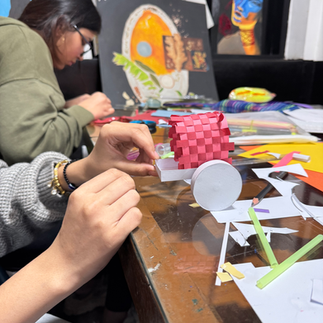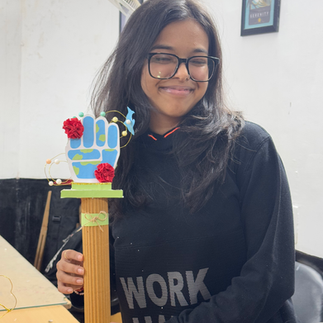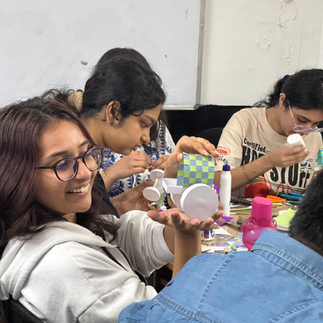Mastering the NIFT Situation Test: A Comprehensive Guide
- desizn circle International
- Feb 21
- 4 min read
Updated: Mar 12
The National Institute of Fashion Technology (NIFT) Situation Test is a crucial phase for aspirants aiming to secure admission into India's premier fashion institute. This test is the second level of the selection process, conducted after candidates clear the NIFT written entrance exam, commonly referred to as the CAT (Creative Ability Test) and GAT (General Ability Test). The Situation Test assesses a candidate’s ability to think creatively, innovate under pressure, and translate their design ideas into three-dimensional models.

Understanding the NIFT Situation Test
The NIFT Situation Test evaluates the creative and material-handling skills of the candidates. Unlike the written exams that test theoretical knowledge and aptitude, this practical test measures a student’s ability to work with various materials to create a physical model based on a given theme or situation. Aspirants are judged on several criteria, including innovation, creativity, aesthetic appeal, the neatness of execution, and the clarity of the concept.
Typically conducted in April, right after the preliminary results are announced, this test challenges students to create 3D models using provided materials such as ivory sheets, ice cream sticks, toothpicks, ribbons, wires, clay, and more. Candidates must also submit a write-up explaining their model’s concept, functionality, and relevance to the given topic.
The importance of this test lies in its ability to reveal how effectively a student can transform abstract ideas into tangible, aesthetically pleasing designs. The results of the Situation Test, combined with the earlier written exams, determine whether a student qualifies for the final counselling and selection process, which usually occurs at the end of May. The weightage of this exam is 20%.
How Desizn Circle Prepares Students for the NIFT Situation Test
Desizn Circle has been at the forefront of preparing NIFT aspirants for years, offering both online and offline coaching tailored to the unique demands of the Situation Test. Recognizing that most students encounter this type of test for the first time, Desizn Circle ensures comprehensive preparation through hands-on practice and expert mentorship.
In 2025, Desizn Circle started preparations even before the announcement of Level 1 results. This proactive approach gives students a significant head start, allowing them to familiarize themselves with the materials and test format well in advance. The institute’s structured methodology ensures that each student, whether new to the test or with some prior experience from school, gets ample practice and guidance.
Offline Preparation
For students who prefer hands-on learning in a physical setting, Desizn Circle’s offline classes provide an immersive experience. These sessions simulate real exam conditions, allowing students to practice with the exact materials they will encounter in the actual test—such as ivory sheets, ice cream sticks, toothpicks, ribbons, wires, and clay.
Experienced mentors guide students through various exercises, focusing on:
Material Familiarity: Learning to work creatively with everyday materials.
Time Management: Completing models within strict time limits.
Concept Clarity: Developing innovative ideas that can be effectively translated into 3D models.
Neatness and Detailing: Ensuring precision and attention to detail, which are crucial for scoring high marks.
Mock tests, peer reviews, and one-on-one mentoring ensure that each student’s weaknesses are addressed, and their strengths are enhanced.
Online Preparation
Understanding the growing need for flexible learning, Desizn Circle also offers an extensive online preparation program. This mode is ideal for students who cannot attend in-person sessions due to geographical constraints or personal schedules.
The online program includes:
Live Interactive Classes: Real-time sessions where students can interact with instructors and get immediate feedback.
Video Tutorials: Pre-recorded lessons that students can revisit at their convenience.
Material Handling Workshops: Virtual demonstrations on how to use different materials effectively.
Assignments and Feedback: Regular practice assignments followed by detailed feedback from mentors.
This blended learning approach ensures that online students receive the same level of personalized attention and practice as those attending in-person classes.
Why Early Preparation Is Key
The Situation Test takes place soon after the NIFT prelims results are declared, typically around the second week of April. With limited time between the results announcement and the test, starting preparation early is critical. Desizn Circle’s early preparation strategy in 2025 ensures that students are well-equipped and confident by the time the exam date arrives.
Early preparation offers several advantages:
Material Mastery: Students become comfortable using various materials creatively.
Conceptual Clarity: More time allows for refining ideas and understanding what judges look for.
Reduced Anxiety: Familiarity with the format reduces exam-day stress.
Practice Under Time Pressure: Simulating test conditions helps improve speed and efficiency.
Post-Test Process: Counselling and Admission
Once the Situation Test concludes, NIFT releases the final results by the end of May. Based on their overall performance—combining scores from the written exams and the Situation Test—students proceed to the counselling phase.
During counselling, students choose their preferred courses and campuses based on their ranks and available seats. This stage is critical, as it determines the course specialisation and campus where the student will spend the next few years of their academic journey.






























































































